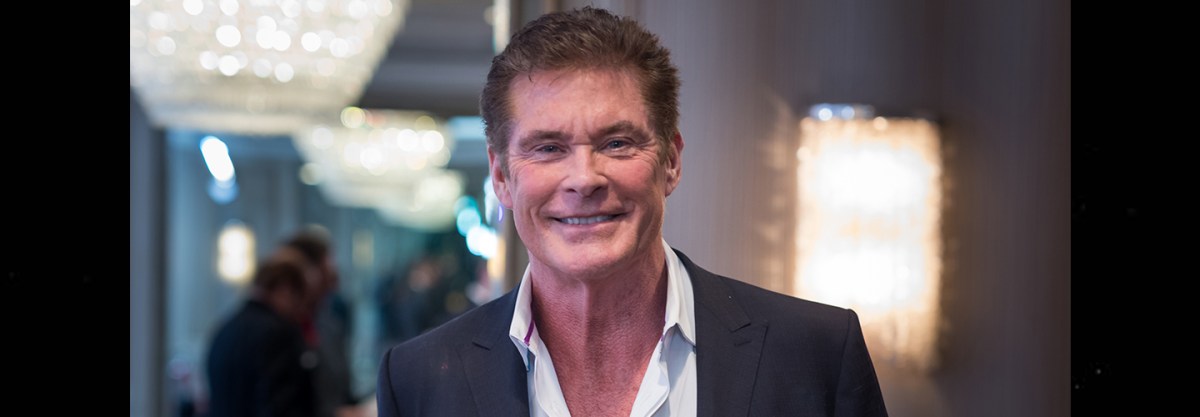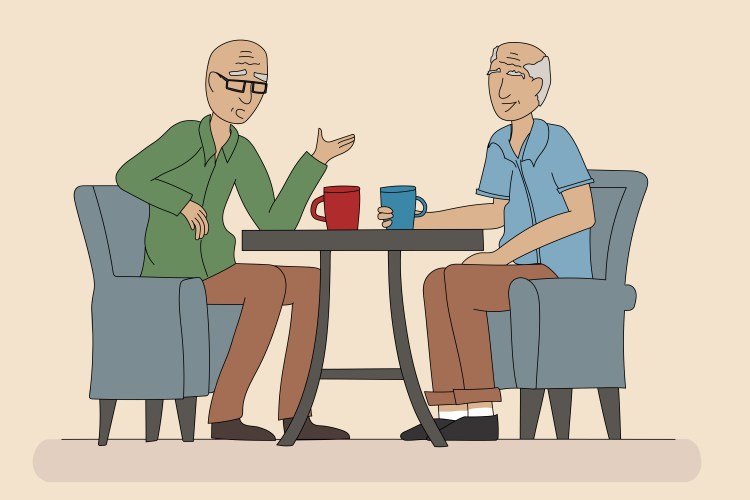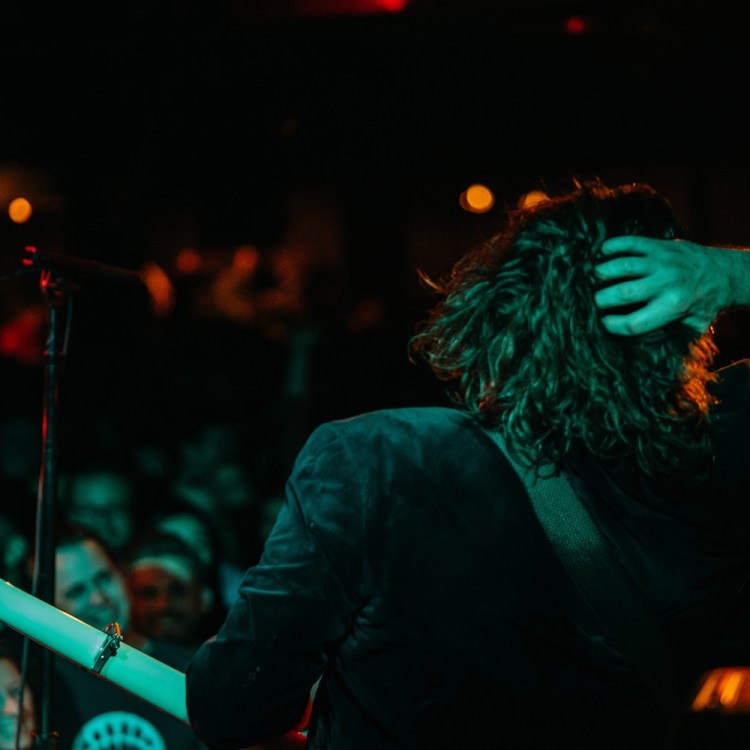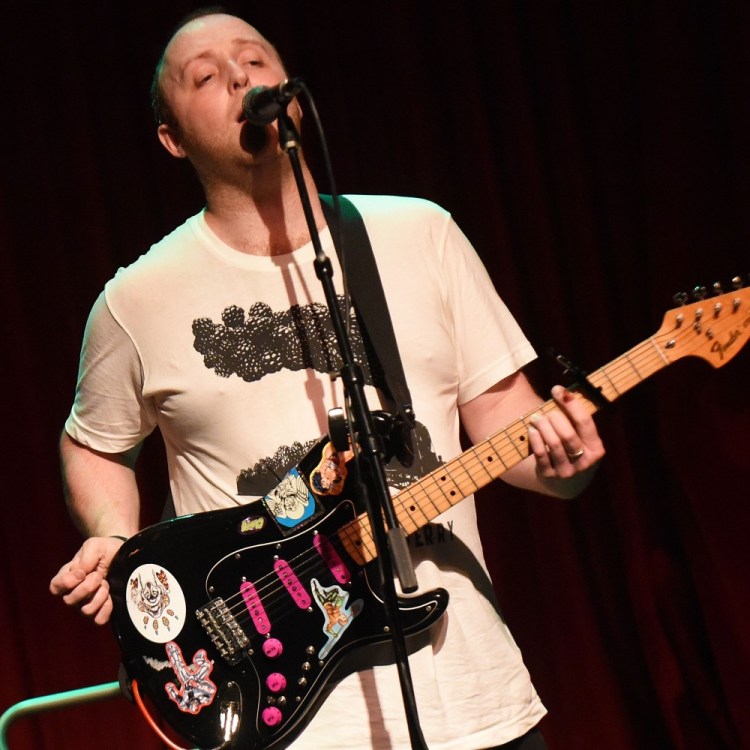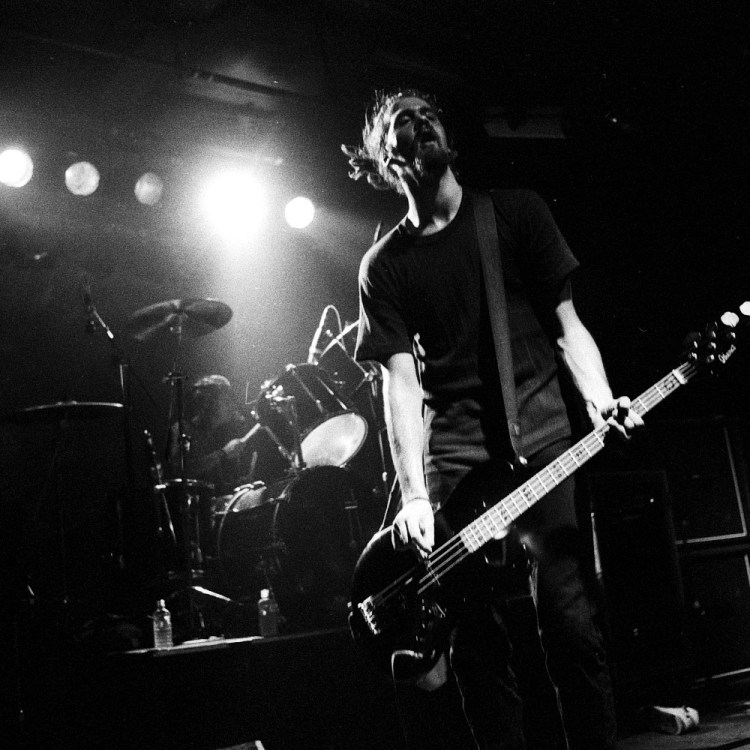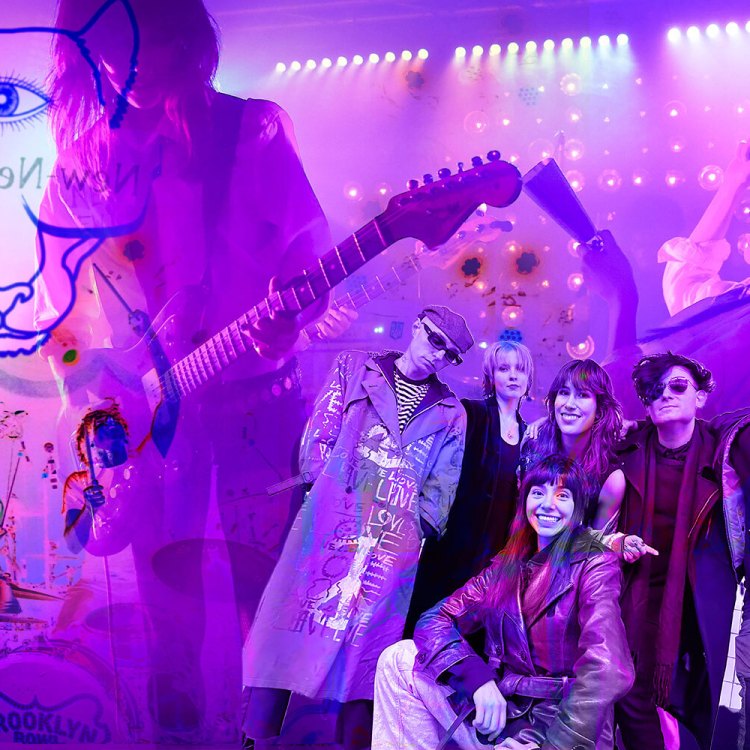David Hasselhoff doesn’t need you to like him. It’s easy to do— the 65-year-old is a pop culture mainstay and wears the type of welcoming and upbeat kindness you’d expect in an old friend — but if you don’t, there’s someone to take your place. A bonafide multi-platinum rock star in Europe, “The Hoff” is busy: He just announced a spring tour in Germany and Austria where he’ll perform for nearly two dozen packed venues. He’s working on a resort in Bali and sketching out plans for another fan cruise through the Mediterranean after a successful trip last November. Most recently, he made headlines for signing onto Kung Fury, the forthcoming Michael Fassbender-led movie brought to life by a beloved cult comedy short Hasselhoff sang the theme song for.
“The true story is that David Sandberg, who wrote and produced the film in his grandmother’s house with a blue screen, went on Kickstarter and raised $600,000, and then asked if he could get David Hasselhoff to sing the theme song, because he knew that I sing,” Hasselhoff told RealClearLife. “He lives in Sweden, and everybody in Europe knows that I sing. I looked at ten seconds of it and I said, ‘I’m in.’”
Everybody in Europe —or at least, a lot of them —do know that he sings, and Hasselhoff says it’s the biggest difference between his celebrity internationally and how people perceive him in the United States, which can border on an ironic kind of appreciation.
“I was at a restaurant last night called the Catch, and the whole place went nuts,” Hasselhoff recounted, speaking from his home in Malibu, California. “They sent me over free food and said, and most of them were men, and they all said to me — ‘We love Knight Rider, we love you, you’re The Hoff.’ But they don’t know about my music career.”
It’s led to a bit of a misunderstanding, actually, and during the course of our phone call, it is the one point he continually hammers home and makes clear: He acknowledges that his song Looking for Freedom propelled him to superstardom in Germany and brought hope to the country as the cold war came to a close, but he adamantly denies taking credit for bringing down the Berlin Wall itself.
“I never said that,” Hasselhoff insists. “For so many years, they were making a joke about [me saying] I was responsible for the wall. A lot of the East Germans still believe I did, and it was part of their life, [but] it was only because they were singing, “I’ve been looking for freedom,” he sang into the phone. “And that song became…” he pauses for a moment. “It was so big, that it crossed over into East Germany and became to them — from an East German’s mouth, not mine — it became a hymn, it became a song of hope, because they were looking for freedom, and here’s the frickin’ Knight Rider singing on the wall about freedom.”
Nadja Eigendorf, 38, was born and raised in East Berlin and remembers traveling to her grandparents’ house on the weekends to get West German television. There she found Hasselhoff and subsequent hope in his music that has lasted throughout her life.
“He kept telling his fans to believe in yourself, that no matter what you want to do your dreams can come true, and that kept me going on, no matter what happened,” Eigendorf said in a phone interview. “I lost my father when I was seven, and when I was twelve, my mom had a partner [who] used to treat us really badly. And whenever he made me cry I used to run to my room and listen to David’s music, and his voice could calm me down. From one moment to the other, there was this, I don’t know. I just realized there has to be someone who would never have treated [me] like that.”
Hasselhoff’s music isn’t a strictly German phenomenon, either. While he’s known to Americans as a Baywatch heartthrob, the messages of perseverance and acceptance in his music spread to fans in other parts of Europe. Paula Fachal, a 36-year-old from A Coruña, Spain, suffered a brain injury at birth and discovered Hasselhoff’s music when she was 8.
“He is very kind to people like us, special,” Fachal, who also leads an online fan club, said in Spanish through a translator. “He has a magical voice, it comes from his heart.”
But Hasselhoff’s music never picked up the same way in the U.S., though he has performed in musicals and on Broadway throughout the last 15 years, even singing as a judge on America’s Got Talent. But he can remember being “kind of laughed at” when he got serious about trying to lock down a record deal this side of the Atlantic.
“I think that it was really difficult for me to cross over to the United States because the record companies weren’t interested,” Hasselhoff said. “Nobody wanted to sign me. So I said, ‘I don’t care. I’m just going to go to Germany and put on my rock clothes and have fun,’ and I did.”
With fun came high-profile struggles. In a 2007 tape seen around the world, an intoxicated Hasselhoff struggles to eat a burger while his daughter Taylor-Ann, then 16, confronts him about his excessive drinking. Hasselhoff has been open about battling alcohol addiction in the years since, which hasn’t gone unnoticed by his biggest fans.
“I had some downs,” Eigendorf recalls. “I was drinking, doing a lot of drugs, and when I was going out of it and fighting it, I started thinking about David again. Then I heard of the stories of him, that he was drinking a lot, and I thought: ‘Okay. He’s just a human being like me, so I’m not the only one.’”
Eigendorf continues: “That’s what people like about him, and that’s why people keep following him,” she says. “No matter what you look like, no matter what kind of disease you have, if you’re disabled or not, it doesn’t matter. He respects everyone. And he treats everyone respectfully and normally, and he tries to be nice to everybody.”
He’s also not planning on slowing down.
“There’s days that I get up and I say, “Let’s just move to Bali,” he admits. “But I know once I get to Bali after about five or six days of SCUBA diving and hanging out, I get the itch…I I gotta keep going. I feel like I’m just beginning. You know?”
Hasselhoff says his “quest” right now is to bring back Knight Rider to Netflix or networks — “and I’m quite close,” he says — and he’s also working with music producer Tyler Bates to release a cover of David Bowie’s Heroes for “a kind of new David Hasselhoff” he says he’s excited about.
It’s “synonymous with what’s happening in the world,” Hasselhoff tells me of the song, tiptoeing around any direct comments on politics or the president.
“It’s going to be, I hope — from my words to God’s ears — a big hit,” Hasselhoff says, “at least in Germany. If the song would be considered ‘cool’ in America because of Tyler Bates’ arrangement, we might have a shot. But I don’t really care,” he says, breaking into laughter again. “It’s like, ‘Who cares?’ You make movies and television and theater and Broadway … I just do whatever happens. Whatever’s thrown in front of me, because it’s fun, it’s fun! Can I do plumbing? Can I stop the sink from leaking? No. It’s impossible. I don’t know how to repair anything. But I know how to entertain. And that’s what I do.”
Nico Caruso translated Spanish for the Paula Fachal interview.
This article was featured in the InsideHook newsletter. Sign up now.
